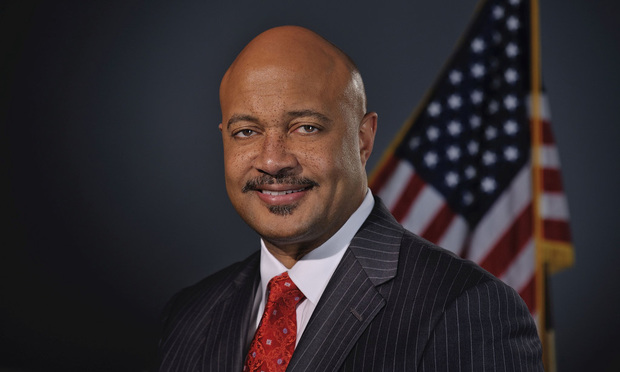Indiana Supreme Court Suspends State AG's Law License for 30 Days Over Groping Claims
The state justices found Indiana Attorney General Curtis Hill's "criminal conduct was prejudicial to the administration of justice."
May 12, 2020 at 02:20 PM
3 minute read
 Indiana Attorney General Curtis Hill Jr./courtesy photo
Indiana Attorney General Curtis Hill Jr./courtesy photo
The Indiana Supreme Court suspended Indiana Attorney General Curtis Hill's law license for 30 days after the state justices found he inappropriately touched four women in March 2018 in violation of local bar rules.
In the decision issued Monday, the justices found Hill's conduct compromised his fitness to serve as a lawyer and that his "criminal conduct was prejudicial to the administration of justice."
The suspension will begin on May 18 and his license will be automatically reinstated, according to the court's order. Hill said in a series of tweets Monday that he accepts the court's finding "with humility and respect," and chief deputy Aaron Negangard will take over his office's legal operations during the suspension.
The allegations against Hill, a Republican, first surfaced in July 2018 when a memo prepared by a law firm for lawmakers on Hill's alleged conduct leaked to the media. The four women he allegedly groped—three legislative assistants and a state legislator—filed a federal lawsuit against Hill, but no criminal charges have been filed.
The hearing officer in Hill's case recommended a 60-day suspension without automatic reinstatement, citing emails dismissive of the claims that were exchanged among Hill and his team after the allegations were leaked. Among those messages was the rejected suggestion by one staffer to describe the allegations against Hill, who is black, as a "lynching," according to the emails described in Monday's ruling.
The justices did take issue with Hill's attempt to block those emails from being submitted as evidence. They wrote the attorney general's "claim of privilege, based on the notion that the emails contain legal advice rendered to him in his capacity as attorney general by counsel within his office, is fundamentally at odds with respondent's insistence that only his private conduct is at issue and that his office employees participated in these team endeavors on their own personal time, using their own private email accounts, and in their personal capacities as respondent's political supporters."
"Simply put, respondent cannot have it both ways," they added. However, the court found the emails were "only minimally relevant to the question of an appropriate sanction."
"Although respondent strayed past an appropriate line in some of his conduct after the Taft Report was leaked, he was apologetic in his initial discussions with legislative leaders before the leak, and in a press release after the leak respondent maintained his innocence but simultaneously emphasized that '[v]ictims of sexual abuse and/or sexual harassment deserve to have their voices heard,'" the justices wrote.
The court also took issue with both Hill's attorneys and the Indiana Supreme Court's disciplinary commission's conduct, saying they are "compelled to note our strong disapproval and extreme disappointment with respect to the tenor of the parties' briefs in this case."
"There are many legitimate legal arguments to be made in this case, which makes the parties' inappropriate ad hominem attacks on one another a particularly frustrating distraction. We expect counsel to behave better in future cases," the court wrote.
Hill was represented by Indianapolis attorneys Donald Lundberg, James Voyles and Jennifer Lukemeyer.
This content has been archived. It is available through our partners, LexisNexis® and Bloomberg Law.
To view this content, please continue to their sites.
Not a Lexis Subscriber?
Subscribe Now
Not a Bloomberg Law Subscriber?
Subscribe Now
NOT FOR REPRINT
© 2025 ALM Global, LLC, All Rights Reserved. Request academic re-use from www.copyright.com. All other uses, submit a request to [email protected]. For more information visit Asset & Logo Licensing.
You Might Like
View All
Indian Law Firm Cyril Amarchand Rolls Out AI Strategy, Adopts Suite of AI Tools

Houston Law Firm Files $250K Breach of Contract Suit Against 2 Former Lawyers
3 minute read
Former Director's Retaliation Suit Cleared to Move Forward Against Hospice Provider
3 minute read
LSU General Counsel Quits Amid Fracas Over First Amendment Rights of Law Professor
7 minute readTrending Stories
Who Got The Work
J. Brugh Lower of Gibbons has entered an appearance for industrial equipment supplier Devco Corporation in a pending trademark infringement lawsuit. The suit, accusing the defendant of selling knock-off Graco products, was filed Dec. 18 in New Jersey District Court by Rivkin Radler on behalf of Graco Inc. and Graco Minnesota. The case, assigned to U.S. District Judge Zahid N. Quraishi, is 3:24-cv-11294, Graco Inc. et al v. Devco Corporation.
Who Got The Work
Rebecca Maller-Stein and Kent A. Yalowitz of Arnold & Porter Kaye Scholer have entered their appearances for Hanaco Venture Capital and its executives, Lior Prosor and David Frankel, in a pending securities lawsuit. The action, filed on Dec. 24 in New York Southern District Court by Zell, Aron & Co. on behalf of Goldeneye Advisors, accuses the defendants of negligently and fraudulently managing the plaintiff's $1 million investment. The case, assigned to U.S. District Judge Vernon S. Broderick, is 1:24-cv-09918, Goldeneye Advisors, LLC v. Hanaco Venture Capital, Ltd. et al.
Who Got The Work
Attorneys from A&O Shearman has stepped in as defense counsel for Toronto-Dominion Bank and other defendants in a pending securities class action. The suit, filed Dec. 11 in New York Southern District Court by Bleichmar Fonti & Auld, accuses the defendants of concealing the bank's 'pervasive' deficiencies in regards to its compliance with the Bank Secrecy Act and the quality of its anti-money laundering controls. The case, assigned to U.S. District Judge Arun Subramanian, is 1:24-cv-09445, Gonzalez v. The Toronto-Dominion Bank et al.
Who Got The Work
Crown Castle International, a Pennsylvania company providing shared communications infrastructure, has turned to Luke D. Wolf of Gordon Rees Scully Mansukhani to fend off a pending breach-of-contract lawsuit. The court action, filed Nov. 25 in Michigan Eastern District Court by Hooper Hathaway PC on behalf of The Town Residences LLC, accuses Crown Castle of failing to transfer approximately $30,000 in utility payments from T-Mobile in breach of a roof-top lease and assignment agreement. The case, assigned to U.S. District Judge Susan K. Declercq, is 2:24-cv-13131, The Town Residences LLC v. T-Mobile US, Inc. et al.
Who Got The Work
Wilfred P. Coronato and Daniel M. Schwartz of McCarter & English have stepped in as defense counsel to Electrolux Home Products Inc. in a pending product liability lawsuit. The court action, filed Nov. 26 in New York Eastern District Court by Poulos Lopiccolo PC and Nagel Rice LLP on behalf of David Stern, alleges that the defendant's refrigerators’ drawers and shelving repeatedly break and fall apart within months after purchase. The case, assigned to U.S. District Judge Joan M. Azrack, is 2:24-cv-08204, Stern v. Electrolux Home Products, Inc.
Featured Firms
Law Offices of Gary Martin Hays & Associates, P.C.
(470) 294-1674
Law Offices of Mark E. Salomone
(857) 444-6468
Smith & Hassler
(713) 739-1250








